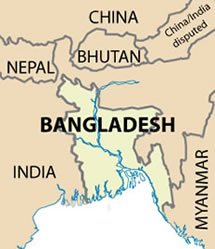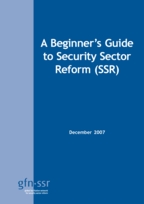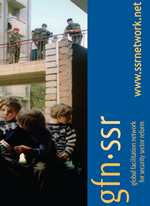Bangladeshi Police Reform
Two years after the current Caretaker Government (CTG) came to power in Bangladesh, the general elections this month are expected give power back to the political parties. The next elected government will have the opportunity to lead an unprecedented trend of reform in the security sector. During the last two years, the Bangladesh police have been engaged in a reform process with the support of international donors. The most notable examples of this are the drafting of a new police ordinance modernising the role and mission of the police, and a community policing strategy focused on crime prevention and reduction. The number and extent of challenges – namely the limitation of resources, political interference, corruption and historical legacy of the police (which is seen as a force of the executive rather than a service for the people) – will indeed necessitate the full support of the new government.
First, resource limitations explain understaffing, work overload and the poor record of crime investigation of the Bangladesh police. The ratio of 1 policeman to 1100 people is significantly lower than in India (1/600) or Pakistan (1/700). With a total annual budget of $177.8 million, the Bangladeshi police receive annually only $1.40 per inhabitant. A police officer in Bangladesh is regularly required to work 13 or 14 hours per day, often with no weekly holiday. In addition, the lack of adequate vocational training, transport or forensic equipment does not allow for improvements in crime prevention, detection and investigation.
Secondly, politics have traditionally interfered with the police sector and undermined its independence and professionalism. Through appointments, promotions, and transfers of high-ranking police officers, the executive branch has a direct hand in the police. Several committees tasked with reducing the potential for interference have been convened since Bangladesh’s independence in 1971, but no government has ever implemented the resulting recommendations.
Thirdly, against the backdrop of the two previous phenomena, corruption has become a major concern. Most importantly, one must distinguish “greed-based corruption” from “need-based corruption”. While some high-ranking officers make a big profit from their complacency, field officers do not often earn enough to feed their families. Because almost all of the police stations struggle to run with the funds they receive from the government, alternative ways of earning money become a condition of their functioning.
Last but not least, the colonial legacy is still shaping not only the role and mission of the police but also its relationship to the public. Created by the colonial power, the 1861 law emulated the law governing the Irish constabulary (Ireland was then also under British rule) and made the police an instrument of the executive. The main concerns then were land revenue collection and the maintenance of order. As a result, the police in Bangladesh are a very centralised and largely reactive force that does not enjoy popular support.
The Bangladesh police have recognised these challenges and are today leading a comprehensive and fast reform process with the support of international donors. The state of the police reflects that of the society; thus the reform agenda will be either driven or blocked by political considerations rather than policy recommendations. To be successfully implemented, the reform process may have to slow down in order to include not only political and bureaucratic elites, but also communities and civil society in defining the new role and mission of the police.
This summary is based on the findings of a recent Saferworld mission to Bangladesh. Saferworld is an international conflict prevention organisation working in the areas of SSR, SALW and community safety in Europe, Africa and Asia. For more information, please visit the Saferworld website.
Useful links for Bangladesh
- BBC Country Profile: Bangladesh
- United Nations in Bangladesh
- Bangladesh Institute of International and Strategic Studies (BIISS)
- Saferworld
- DFID – Bangladesh
GFN-SSR Document Library
The Document Library contains links to a number of SSR related documents either focussing specifically on SSR in Bangladesh looking at the country alongside others as a case study. A selection of these are listed below:
-
The Human Security Framework and National Human Development Reports: A Review of Experiences and Current Debates
Author: Richard Jolly | Deepayan Basu Ray (2006)
How have National Human Development Reports (NHDRs) incorporated issues of human security into their socio-economic analyses of countries emerging from conflict or facing insecurity? What possibilities exist for a people-centred security framework to contribute to policy formulation in the future? This paper from the United Nations Development Programme (UNDP) reviews the history of the human security approach and surveys 13 NHDRs to evaluate the challenges and opportunities presented by this perspective. It argues that studies of human security needs to have significant constructive policy implications, and that NHDRs’ methodologies should be developed to increase their impact. -
Building effective states: Taking a citizen’s perspective Author: Eyben, R. | Ladbury, S. (2006)
How can a citizen-centred approach to development build effective states by improving relations between state and society? This paper from the Development Research Centre on Citizenship, Participation and Accountability, gives an overview of current debates and analyses citizens’ own views on these issues. It argues that a state’s legitimacy is strengthened by civic participation, which often grows up around local issues, and can be empowered through donor support.
-
Law and Policy Reform in Asia and the Pacific: Ensuring Voice, Opportunity and Justice
Author: Asian Development Bank (2005)
How has the Asian Development Bank (ADB) helped its developing member countries (DMCs) in Asia and the Pacific to undertake legal reforms? This paper from the ADB outlines initiatives adopted to reform legislative, institutional and judicial structures, raise awareness of individuals’ legal rights and strengthen government capacity. It argues that law reform is a central component in reducing poverty, promoting growth and empowering marginalised groups.
-
Small Arms and Human Insecurity: Reviewing Participatory Research in South Asia
Author: Dipankar Banerjee | Robert Muggah (2002)
Does participatory research provide added value in identifying qualitative aspects of small arms-related insecurity? What impacts have communities in South Asia experienced as a result of the availability and use of small arms? This report from the Regional Centre for Strategic Studies (RCSS) and the Small Arms Survey (SAS) presents findings from a project using participatory approaches to measure small arms’ impacts in South Asia. Participatory approaches reveal that prolonged exposure to armed violence has affected livelihoods in South Asia in several short- and long-term ways.










